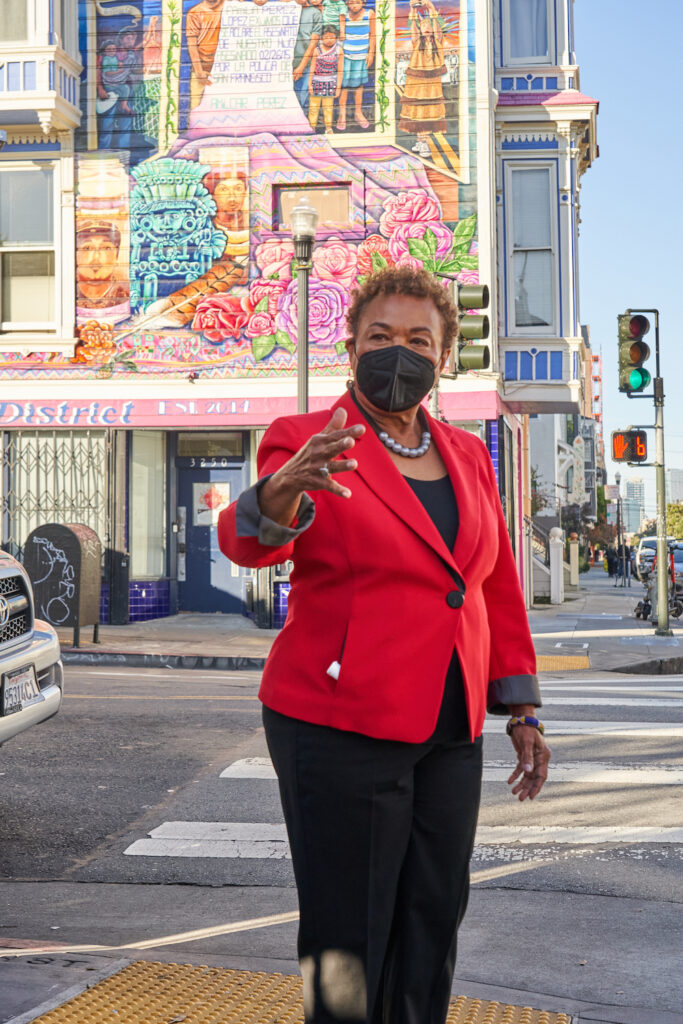Rep. Barbara Lee, who is in a tight race for the Democratic nomination for US Senate, was in the Mission Friday, for a merchant walk and meet-and-greet with the Latinx community, as part of a larger statewide outreach move. I got to ask her a question, and she demonstrated why she is one of the few people in Washington who are seriously talking about economic inequality.
My question—which I try to ask anyone running for public office—goes like this:
Two years ago, the RAND Corporation released a study showing that, if we had the same tax structure and economic inequality today that we had in 1975, the bottom 90 percent would have an additional $50 trillion. Should we restore the taxation level of the post-War era [when the very rich paid as much as 80 percent of marginal income in taxes]? What else can we do to address today’s radical economic inequality?

Lee told me about two bills she has introduced, both of which make perfect sense: The OLIGARCH Act, which is a creative approach to a wealth tax, and the CEO Act, which would tax large corporations that pay their CEOs more than 50 times what the median worker makes.
The OLIGARCH Act (read the text here) has an interesting approach: A wealth tax, ranging from 2 to 8 percent, based on how much on individual’s wealth exceeds that of the median taxpayer.
When the wealth gap is radical, as it is today, the taxes will be higher. If the gap evens, as it was in the post-War era, the taxes would be lower.
From Lee:
This level of wealth is not just a source of economic injustice, but a major threat to democracy: the richest 400 people in the U.S. have 22,000 times the political power of the average American. At a time when the GOP is pushing for even deeper tax cuts, I am proud to introduce this vital bill with my progressive colleagues to hold billionaires accountable and make democracy work for the people, not the oligarchs.
The CEO Act is similar to a tax San Francisco imposed in 2020.
Lee told me that “income inequality continues to grow … the gap’s overwhelming, poverty rates are going up.”
Like everyone else I have interviewed in national politics in the past 20 years, she stopped short of saying that the US should return the top marginal income tax rate to what it was before the election of Ronald Reagan.
“I don’t know if we should go back to 1975,” she said.
I understand: Nobody who is running for high office wants to be tagged as the candidate who is going to raise income taxes. The news media is terrible about this. Even discussion about raising income taxes on the very rich gets played as “tax hikes on working people.”
It’s hard for reporters to comprehend that a 70 percent tax bracket doesn’t mean that anyone pays 70 percent of their income to the government. That’s not how progressive taxes work.
Here’s the chart. Everyone, rich or poor, pays the same 10 percent of their first $10,275. Everyone, rich or poor, pays the same 12 percent of the amount between $10,275 and $41,775. That continues through the brackets.
The very rich, who earn more than $539,900 (for a single person) pay 37 percent of the amount over $539,900.
The idea is that once you have half a million in income, you don’t need as much of the next dollar you earn.
The system in place from World War II until 1980 added higher categories (here’s a hard-to-read chart.) in 1968, if you made more than $200,000 (that’s $1.178 million in 2023 dollars), you paid 70 percent of your marginal income. That seems like a lot—except that in 1968, nothing cost anywhere near what it does today. Even with high marginal taxes, we had lots of affordable housing. People had enough left after taxes to have decent lives, but the rich didn’t have enough left to price the rest of us out of the game.
The price of housing hasn’t increased just because, as the Yimbys say, there’s not enough supply; it’s because rich people get to keep so much of their money that they can afford to pay huge sums for housing. And for cars. And for so many other things.
That’s one of the roots of economic inequality.
Now, because we haven’t taxed income fairly for more than 40 years, we have no choice but to push for wealth taxes. But that wealth wouldn’t have accumulated without the Reagan-era tax cuts, that no Democratic president or Congress since then has challenged.
The $50 trillion the rich have stolen would pay for free college education, free national health care, cheap social housing, and end to homelessness, and so much more.
The wealth tax is critical to addressing the immediate crisis of economic inequality. The progressive income tax is critical to preventing it in the future.
That’s probably not a winning strategy for US Senate today. Which is a very, very sad commentary on the state of US news media.





